 Today I’m delighted to welcome writing friend Jane Davis back to the writing blog. I’ve loved her books; they regularly appear in my best books of the year round up. Her first novel, ‘Half-Truths and White Lies’’, won a national award established with the aim of finding the next Joanne Harris. Today I’m delighted to welcome writing friend Jane Davis back to the writing blog. I’ve loved her books; they regularly appear in my best books of the year round up. Her first novel, ‘Half-Truths and White Lies’’, won a national award established with the aim of finding the next Joanne Harris.
Further recognition followed in 2016 with ‘An Unknown Woman’ being named Self-Published Book of the Year by Writing Magazine/the David St John Thomas Charitable Trust, as well as being shortlisted in the IAN Awards, and in 2019 with ‘Smash all the Windows’’ winning the inaugural Selfies Book Award. Her novel, ‘At the Stroke of Nine O’Clock’ was featured by The Lady Magazine as one of their favourite books set in the 1950s, selected as a Historical Novel Society Editor’s Choice, and shortlisted for the Selfies Book Awards 2021.
Interested in how people behave under pressure, Jane introduces her characters when they are in highly volatile situations and then, in her words, she throws them to the lions. The themes she explores are diverse, ranging from pioneering female photographers, to relatives seeking justice for the victims of a fictional disaster.
Jane lives in Carshalton, Surrey, in what was originally the ticket office for a Victorian pleasure gardens, known locally as ‘the gingerbread house.’ Her house frequently features in her fiction. In fact, she burnt it to the ground in the opening chapter of ‘An Unknown Woman’ and in ‘Small Eden’ it was the gardener’s cottage. When she isn’t writing, you may spot Jane disappearing up the side of a mountain with a camera in hand.
Now she’s letting me grill her about her latest, The Bookseller’s Wife.
What was the seed of the story in The Bookseller’s Wife?
In September 2022, I took a small research trip to the ancient church of St Mary’s in Merton. Small, because it’s only a ten-minute walk from my mother’s house. As a child, I took ballet lessons in the parish hall, but I rarely ventured inside the church, which dates from the tenth century. My intention was to visit the place where Nelson worshiped and see his custom-made bench, now heavily alarmed, but which one of my aunts was given special permission to sit on when she was a seven-year-old bridesmaid at her sister’s wedding. Walking among the gravestones, one caught my eye.
DORCAS, WIFE OF J LACKINGTON
Bookseller, Finsbury Square
Died January 27th 1795, aged 46 years.
What could be more intriguing? I read in the church guide that Dorcas was an avid reader of novels and took a leading share in running her husband’s book shop – The ‘Temple of the Muses,’ Finsbury Square. I had to know more!
Where did your research lead you?
 A model for Dorcas? Mrs Ralph Izard by Thomas Gainsborough I learned from parish records that Dorcas was the sole survivor of six children born to Jemima Turton and her husband, Samuel. The statistic seems shocking now, but in 18th century London only one in five children made it to the age of five.
As always with historical research, it’s easier to find information about a man than a woman, and so I turned first to her husband. James Lackington left us with two memoirs, written primarily to promote himself as a successful entrepreneurial innovator in the world of bookselling. While his writing must be taken with a liberal pinch of salt, there is substance in dates and key events.
James Lackington’s memoirs tell us that Dorcas’s mother, Jemima Turton, was grand-daughter of the Honourable Sir John Turton, Baron of the Exchequer and Justice of the King’s Bench. She was so proud of her lineage that she kept her maiden name in the only way a woman could – by marrying a man with the same surname, possible a cousin. Since Samuel Turton had a fortune of his own, the family should have been comfortably off, but owing to ‘an unhappy turn for gaming,’ he was forced to turn to trade. Even after setting himself up as a saddler’s ironmonger, he couldn’t give up gambling. These days we would recognise addiction rather than weakness of character. Jemima Turton didn’t live to see her husband’s financial ruin, dying in early 1773. Dorcas then supported her father, setting up a day-school for girls and taking in needlework.
How old was Dorcas at that time?
We meet Dorcas when she is twenty-five, a pivotal age for woman. Jane Barker wrote in her 1688 poem, A Virgin Life, that she hoped was able to remain ‘Fearless of twenty-five and all its train, / Of slights or scorns, or being called Old Maid.’ With the average age for marriage standing at seventeen, she would be passing from a young single woman to old maid, and very much aware that her marriage prospects were rapidly decreasing.
You mention that Dorcas set up a day-school for girls. What kind of education would she have received?
While sons of her class were often sent to boarding schools, girls were might be sent to ‘dame schools’ but more commonly were taught by governesses at home. Lessons might involve reading, writing, languages and music, but the chief emphasis was to prepare girls to become to become wives and mothers.
A popular book at the time was The Governess by Sarah Fielding. It begins with an introduction:
‘The Design of the following Sheets is an endeavour to cultivate an early inclination to Benevolence, and a love of Virtue in the minds of young women, by trying to shew them that their True Interest is concerned in cherishing and improving those amiable Dispositions into Habits and keeping down all rough and boisterous Passions, and that from this alone they can propose to themselves to arrive at true Happiness in any of the Stations in Life allotted to the Female Character.’
I don’t know about you, but already I find myself chaffing – and that is before we learn that ‘Mr Teachum was a very sensible man who took great pains in improving his wife.’
 Mary Wollstonecraft by John Opie But changes were afoot. Towards the end of the century, support for the education of daughters was mounting. The growing merchant class saw the importance of educating daughters so that they could take active roles in the running of family businesses. Early campaigners that daughters’ education should equal sons’ included Mary Wollstonecraft, the mother of Mary Shelley.
Like Dorcas, Mary Wollstonecraft was born into prosperity to a father who squandered the family money. And like Dorcas, Wollstonecraft opened a small girls’ school. She would go on to write A Vindication on the Rights of Women and Thoughts on the Education of Daughters, arguing that daughters who were raised from an early age to prize physical beauty and personal charms made poor citizens, inadequate companions to men, and even ineffective mothers. She insisted that education should be universal and freely accessible, so that women could cultivate their minds, learn skills and gain financial independence. I like to think that although Dorcas turned to teaching out of necessity, she would have shared those views.
The other thing that we learn from James Lackington’s memoirs is that Dorcas was immoderately fond of books, and would frequently read until morning… Who having acquired a few ideas, was at that time restless to increase them. The picture we get is of a young woman who is curious, intelligent, practical and resourceful.
Thank you, Jane. These are particularly pertinent thoughts during Women’s History Month.
And Jane has given us the treat of an excerpt from The Bookseller’s Wife:
As she brushes out her hair Dorcas mulls over the evening’s conversation. Is there one among her pupils who could do great things? Judith, perhaps? In her mind’s eye, she sees John Milton’s Eve, peering into a pool of still water and falling in love with her own reflection. But it’s unfair to single out Judith. Are her girls even aware of what possibilities might be open to them? Though there are constant murmurings of a cultural revolution, Dorcas reluctantly concedes that her father was right: Bassi was an exception. So too are almost all of the remarkable contemporary women Dorcas can name. Would Elizabeth Caslon have been in a position to put her name to a company had her husband not died without making a will? Dorcas’s brush snags on a knot. She takes a fistful of hair close to her scalp so that she can work at it. Whenever a woman is strong or intelligent or steps away from the hearth, it is said that she possesses masculine qualities. This is the world her pupils must navigate. One that is hostile to women who dare to display confidence, fail to fawn, and when cut off mid-sentence by fathers or husbands, do not lower their doe-like eyes in submission.
Yet these obstacles shouldn’t deter Dorcas. Provided her pupils’ conversation sparkles, provided they know when to be sweetness and light, there is nothing to prevent her from introducing examples of remarkable womanhood into their lessons. How else shall they develop ambitions of their own? After all, earlier this century a female monarch sat on the throne. Is that perhaps a suitable question for discussion? Why a female monarch failed to promote the education of women, so that they might be admitted to universities and thence to the professions? Dorcas sets down her brush. It would be a start.
What’s The Bookseller’s Wife about?
Books have been her only solace. Now they’re about to change her life.
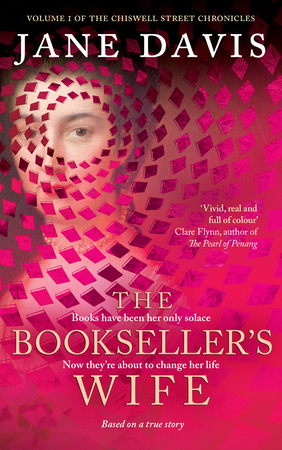 London, 1775: The only surviving child of six, Dorcas Turton should have been heiress to a powerful family name. But after her mother’s untimely death, she is stunned by the discovery that her father’s compulsive gambling has brought them close to ruin. With the threat of debtor’s prison looming large, she must employ all her ingenuity to keep their creditors at bay. London, 1775: The only surviving child of six, Dorcas Turton should have been heiress to a powerful family name. But after her mother’s untimely death, she is stunned by the discovery that her father’s compulsive gambling has brought them close to ruin. With the threat of debtor’s prison looming large, she must employ all her ingenuity to keep their creditors at bay.
Fortunately, ingenuity is something Dorcas is not short of. An avid reader, novels have taught her the lessons her governess failed to. Forsaking hopes of marriage and children, she opens a day-school for girls. But unbeknown to Dorcas, her father has not given up his extravagant ways. When bailiffs come pounding on the door, their only option is to take in lodgers.
The arrival of larger-than-life James Lackington and his wife Nancy breathes new life into the diminished household. Mr Lackington aspires to be a bookseller, and what James Lackington sets out to do, he tends to achieve. Soon Dorcas discovers she is not only guilty of envying Mrs Lackington her strong simple faith and adaptable nature. Loath though she is to admit it, she begins to envy her Mr Lackington…
Based on a true story, Jane Davis’s latest historical novel is for book-lovers everywhere, delivering unforgettable characters, a portrait of Georgian London on the brink of change, and a love song to the life-changing power of the written word.
Buy now at your favourite ebook store: https://books2read.com/thebooksellerswife (universal link)
Paperback release date: 16 April 2024

––––––––––
Connect with Jane
Website: https://jane-davis.co.uk
Facebook: https://www.facebook.com/JaneDavisAuthorPage/
Twitter/X: https://twitter.com/janedavisauthor
Goodreads: https://www.goodreads.com/author/show/6869939.Jane_Davis
––––––––––
My thoughts
Absorbed by Dorcas’s character and values as I was, I found Jane’s vivid and detailed description of her life, her environment and her decisions outstanding. Here is a young woman as intelligent and capable as Jane Eyre, and as principled and determined as Lizzy Bennett. Faced with penury, she gathers up her inner strength and sets to in a practical way to make her life possible and passable. Resolute is a word that could apply to her, especially in respect of her tiresome father.
Every page is a treat – the writing is excellent. I thoroughly recommend this thoughtful and clever read.
Alison Morton is the author of Roma Nova thrillers – INCEPTIO, CARINA (novella), PERFIDITAS, SUCCESSIO, AURELIA, NEXUS (novella), INSURRECTIO and RETALIO, and ROMA NOVA EXTRA, a collection of short stories. Audiobooks are available for four of the series. Double Identity, a contemporary conspiracy, starts a new series of thrillers. JULIA PRIMA, Roma Nova story set in the late 4th century, starts the Foundation stories. The sequel, EXSILIUM, is now out.
Find out more about Roma Nova, its origins, stories and heroines and taste world the latest contemporary thriller Double Identity… Download ‘Welcome to Alison Morton’s Thriller Worlds’, a FREE eBook, as a thank you gift when you sign up to Alison’s monthly email update. You’ll also be among the first to know about news and book progress before everybody else, and take part in giveaways.
If you enjoyed this post, do share it with your friends!Like this:Like Loading...
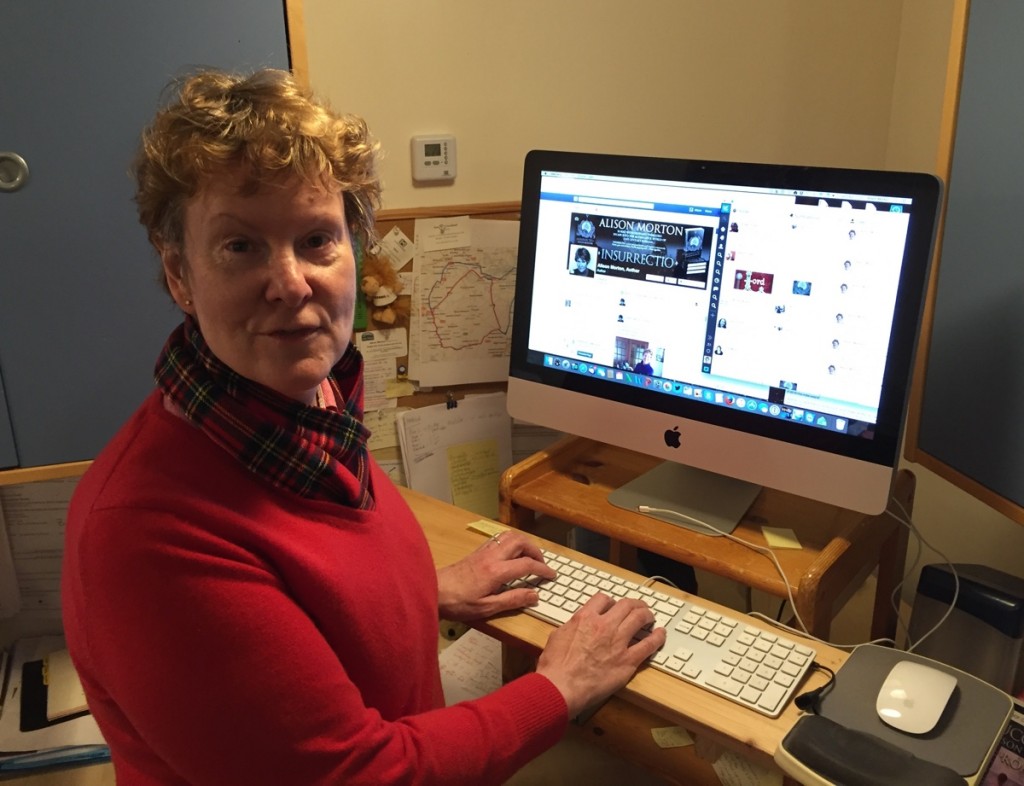 Yes and no. Yes and no.
Writing a novel is creative – you have to have a purpose, some characters and a setting which all interact. Throw in a triggering act to stir them all up and get the story going. Storytellers have known this since the year dot.
A modern novelist is basically a storyteller with a keyboard. But she/he like the traditional storyteller has an imagination that can cast back or forward several thousand years, that looks into the darkest and lightest parts of the human psyche, that digs out motivation, phobias, obsessions and quests, that lets us delight at sunlight, trees and adventure on the high seas and cower at shadows, brutes with cudgels and our own dark thoughts. And one that takes us to places we will never go in real life…
But however uplifting or terrifying, however moral or dubious the story, it has to be written down if it’s to be read by others. Getting the story across and catapulting readers into their worlds is what writers are supposed to do. Perfectly understandably, they want to make a few bob; for some this is the main motivation. Not mine, although I’m always pleased to receive those transfers falling into my bank account.
 As a series writer, I have my characters already. I let them run in my head for a while, have some conversations, get into arguments, flounce off, make up, do something incredibly noble, then something incredibly stupid. After that I buckle down to sketch out my excuse for a plan: 30 lines which start with the inciting incident and end with the resolution. I insert three crises/turning points, a black moment and a climax – much more detail here. As a series writer, I have my characters already. I let them run in my head for a while, have some conversations, get into arguments, flounce off, make up, do something incredibly noble, then something incredibly stupid. After that I buckle down to sketch out my excuse for a plan: 30 lines which start with the inciting incident and end with the resolution. I insert three crises/turning points, a black moment and a climax – much more detail here.
The next step is to type something, usually a large bold ‘I‘ in the centre of the top line of the first page. (I use Roman numerals, for some reason. 😉 ) I look artistically into the distance, which is actually the corner of my office, half close my eyes, then, opening the said eyes, look at the screen and type the first conversation in one and a half line space. Five hundred words later, I get a cup of tea. Then I repeat. And after lunch, I repeat (The typing, not the lunch).
Writing a long piece of fiction entails dedicated slogging away for intense periods in between the chief activity of the day, i.e. going on Facebook. And then you do it again for the next few weeks/months. My books are generally 90-100,000 words. That takes a fair bit of typing. I generally bash the story out, creating a first draft that’s pretty average. However, after six books it seems to be getting easier to produce a reasonably acceptable initial draft.
Editing follows and this is a several stage process: self-edit (me), critique partner edit (free), structural edit (paid professional), copy edit (paid professional), proof-read (me). I don’t put the manuscript aside for a few weeks. It’s not good enough to enter the fallow meadow; it needs a good scything first. After a well-deserved lie-in or even a day off, I gird up, send the draft to my Kindle and read it through. I ignore all the glitches, make no notes and plough on to the end. The objective is to ensure that the story basically hangs together as a story.

Next, I print the whole thing out. Lover of eBooks that I am, I know that I spot more little horrors on paper. I blogged four years ago about my 1-12 steps for this process and I still follow it. One thing I particularly check is each character’s individual time line. Then, sick of the thing, I send the manuscript to my critique partner and have another lie-in.
My critique partner has the instincts of a velociraptor on steroids and marks up the manuscript with humorous, direct and clear notes. A lot of them. I do the same for her. We count it a triumph to receive a sheet back with no red pen marks. This relationship has taken years of trust building and is completely brutal honesty.

More revisions, including some structural. Luckily, they are now not many, but at every editing stage I see other things as I go through. At this stage I check each sentence to see if I can find better words and fiddle with the word order to make it clearer or tighter; basically, add sparkle. Being formal, I’d call it a self executed line-edit.
When I think it’s finished, it’s off to the copy-editor. Yes, she checks my grammar and punctuation, but also continuity, cohesion, sometimes facts, but always the flow. Like any writer, I try to get my speech marks, line returns, hanging indents, spelling and typing completely right – that’s part of a writer’s job – but the editor nails them all down. We work on a collaborative, on-going basis; she raises queries, I answer them in little batches as we go along.
Then the copy-edited manuscript lands in my inbox and I read through and discuss any points with the editor that we haven’t covered during the edit. I transfer it to the Kindle (again!) and read through (again!). By this point, I am so fed up with it that I’m on the verge of consigning the characters to the pit of Tartarus and hurling myself in after them.
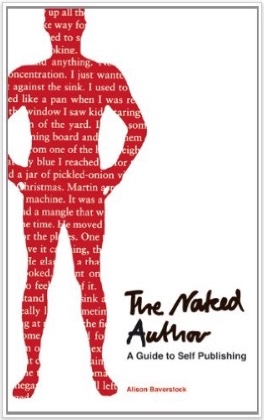 When the galleys come back a few weeks later, formatted and set, I’ve calmed down enough to proof-read them. When the galleys come back a few weeks later, formatted and set, I’ve calmed down enough to proof-read them.
Now this could be dangerous. But in the many years spent as a project manager and editor of translations I notched up at least a couple of million words in proof-reading. I start at the last chapter and work back. I can only do an hour at a time because the concentration of reading each word in each line is intense. For my novels I follow the excellent Alison Baverstock’s methodology in The Naked Author.
So, yes, it’s a process, but no, as without the creativity, you wouldn’t have a story. Thoughts?
(Updated and republished February 2024)
Alison Morton is the author of Roma Nova thrillers – INCEPTIO, CARINA (novella), PERFIDITAS, SUCCESSIO, AURELIA, NEXUS (novella), INSURRECTIO and RETALIO, and ROMA NOVA EXTRA, a collection of short stories. Audiobooks are available for four of the series. Double Identity, a contemporary conspiracy, starts a new series of thrillers. JULIA PRIMA, Roma Nova story set in the late 4th century, starts the Foundation stories. The sequel, EXSILIUM, will be out on 27 February 2024.
Find out more about Roma Nova, its origins, stories and heroines and taste world the latest contemporary thriller Double Identity… Download ‘Welcome to Alison Morton’s Thriller Worlds’, a FREE eBook, as a thank you gift when you sign up to Alison’s monthly email update. You’ll also be among the first to know about news and book progress before everybody else, and take part in giveaways.
If you enjoyed this post, do share it with your friends!Like this:Like Loading...
 Alison as a Roman (AI created) AI – artificial intelligence – seems to be with us. Will it be a horror show stripping us all of jobs, or will it be a useful tool, shortcutting a lot of donkey work and letting us get on with more important creative stuff?
Let me be clear. All my books were written by the sweat of my brow. While I used online resources for research, word checking and typo detection, all the words are mine. I also wrote the product descriptions on retailer sites such as Amazon and the back cover copy for the paperback. I created my own graphics for PR and marketing using my own photos or images I bought with a licence. Where I commissioned PR and marketing images, I paid for them. My covers have been designed by Avalon Graphics and Jessica Bell Design who are experienced book cover designers and warm and genuine people to deal with. I’ve met them both in the flesh!
Now we stand at a new frontier
We’re not quite sure of the way forward. Well, I’m not.
Were the elites and the Church worried by Gutenberg’s invention of a press that could produce multiple copies of texts relatively cheaply and quickly? Perhaps the weavers of the early 19th century who became known as Luddites were justifiably anxious about the new mechanised looms, although organised violent action by other textile workers such as stocking makers had occurred at various times since 1675.
Many wondered about Tim Berners-Lee’s invention and development of the Internet, yet we have integrated it wholeheartedly into our daily life.
But there are downsides. Unemployment, violent repression, starvation, breakdown in civil society, marauders, plunderers and scammers. The balancing cost is the price we pay for such universal progress. These days, multinational corporations want our data from our inside leg measurement and number of tooth fillings to our preferred wine and how many times we swipe our bank card across a terminal.
More than that, they want to know how and why we think and feel
Why? So they can sell our data to people who want to sell us stuff.
Now, before anybody jumps up and down screaming “Conspiracy!”, let’s think about people today. In this age of constant information, no longer solely from radio and television or even the rumour mill, but from the Internet, we have learnt to adapt.
Yes, there are innocent souls who are taken advantage of, but most of us know that not all information is as it seems. Indeed, we are more doubting about media and authority than ever before. As more and more cases of fraud and malpractice come to light, we tend to be wary of that person calling to “fix” our computer, send us a parcel we didn’t order, or claim to be our bank. This is the Stone Age brain risk aversion mechanism kicking in. It was the same instinct that made us careful of the sabre tooth tiger, the door-to-door salesman, the political canvasser or the crypto currency offers too good to be true.
One ethical question is how AI gets its data. Whether voice, images, words or music, it has to acquire knowledge and then process it. Many creative people are taken aback/shocked/angry that their work has been gobbled up by AI acquisition software without payment or recognition so that AI can use it to form answers. Is this a breach of copyright and/or downright plagiarism? Hm. Yes, I found ChatGPT regurgitated my publicly available Amazon retailer page description for one of my books when I asked it to give me an outline for a story. All I had done was input character names and a very vague idea of the story. That was weird.
In a counter argument, you could say that even when formally studying, we research the work of others, scraping their brain work and “stand on the shoulders of giants.” However, we usually credit them. Then there are others who copy essays or even plagiarise other authors to produce their own books. And this has been going on since humans learnt to write. Romans were shockingly bad in this respect as were pamphleteers in the 18th century! Nothing new under the sun, then. But legislation and regulation is on the way for the overwhelming and efficient AI, e.g. the EU agreed a landmark deal on regulation of artificial intelligence. How effective it will be is unknown, but it’s a start.
Printing, radio, telecommunications, satellite technology, the Internet and smart phones have brought us countless advantages and benefits. No more missing your friend in a crowd, no more anxious child stranded when the phone box doesn’t work, no more being unaware of a possible natural disaster affecting us. Warnings of bad weather reach us by text, we can talk in real time to families in Australia, attend events digitally, see the wonders of the rest of the world, respond quickly to events. And as for virtual archaeology and spectral examination of historical objects, thus reaching people who died hundreds, even thousands of years ago – I stare at the screens open-mouthed.
I could go on forever, but I won’t or this post will be infinite. As with past inventions, we need to tread carefully with artificial intelligence. Films such as 2001: Space Odyssey or Terminator amongst others have shown us how ‘machines’ might take over. Yes, that’s dramatic, but we should be aware that each innovation however ground-breaking comes at a cost. But beside fear and scepticism, that other essential human quality – adaptability – comes into play.
Artificial intelligence offers a great deal, most of which I’m probably not aware of, but it is up to us to master it and set the structure and rules for its use. Governments and regulatory authorities are more aware than those of previous ages. While appearing painfully slow or timid – there are elections in the offing – potential misuse and abuse are being examined and legislation introduced. Of course, we don’t know how effective regulations and laws will turn out to be, but at least it’s happening.
How do I stand as a writer/content creator?
I shall continue to write my own stories in my own words based on an outline drawn up by my own brain. Some authors may choose to use AI to generate a plot or some themes, but that’s not for me. Much as it involves ridiculous amounts of time and energy and numerous versions, I shall continue to write my own back cover and retailer page copy. What I flatteringly call my creative spark must remain at the centre of anything I write.
When it comes to PR materials, I may well dabble in the AI pond, in particular for images. So far I’ve only done it for fun as you saw in the above images. But I’ll label them as AI created.
For the future, who knows? But you can be assured that my stories will originate in my brain, human and chaotic as it is.
Alison Morton is the author of Roma Nova thrillers – INCEPTIO, CARINA (novella), PERFIDITAS, SUCCESSIO, AURELIA, NEXUS (novella), INSURRECTIO and RETALIO, and ROMA NOVA EXTRA, a collection of short stories. Audiobooks are available for four of the series. Double Identity, a contemporary conspiracy, starts a new series of thrillers. JULIA PRIMA, Roma Nova story set in the late 4th century, starts the Foundation stories. The sequel, EXSILIUM, will be out in February 2024.
Find out more about Roma Nova, its origins, stories and heroines and taste world the latest contemporary thriller Double Identity… Download ‘Welcome to Alison Morton’s Thriller Worlds’, a FREE eBook, as a thank you gift when you sign up to Alison’s monthly email update. You’ll also be among the first to know about news and book progress before everybody else, and take part in giveaways.
If you enjoyed this post, do share it with your friends!Like this:Like Loading...
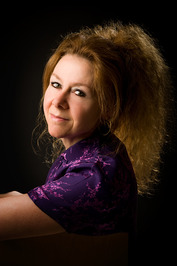
I’m delighted to welcome Christina Courtenay back to the writing blog. She writes historical romance, time slip/dual time and time travel stories, and lives in Herefordshire (near the Welsh border) in the UK. Although born in England, she has a Swedish mother and was brought up in Sweden – hence her abiding interest in the Vikings.
Christina is a Vice President and former Chair and of the UK’s Romantic Novelists’ Association and has won several awards, including the RoNA for Best Historical Romantic Novel twice with Highland Storms (2012) and The Gilded Fan (2014), and the RNA Fantasy Romantic Novel of the year 2021 with Echoes of the Runes. Shadows in the Ashes (dual time romance published by Headline Review 18th January 2024) is her latest novel. Christina is a keen amateur genealogist and loves history and archaeology (the armchair variety).
Over to Christina to tell us how she found ‘writing Roman’!
Thank you very much for having me as your guest!
I’ve been writing historical novels for some time now, and have set my stories in various different eras. Each one is like learning a new language – you have to start with the basics and build your knowledge up until you feel confident enough to create your fictional world. That takes a lot of time and effort, but at the same time it’s great fun!
My new dual time novel Shadows in the Ashes is partly set in AD 79. I’ve previously been writing mainly about the Viking period, so going another thousand years back in time was both exciting and scary for me. I’ve always love reading about the Romans, and you learn a lot from historical novels like Alison’s, absorbing information without even realising it, I think, but I still had to start from scratch when putting together my notes.
I usually create a file with headings in alphabetical order so that I can find the details whenever I need them – houses, clothes, food, laws, daily life etc. After a while, it starts to build up a picture in my mind and that’s when I’m ready to begin writing the actual story.
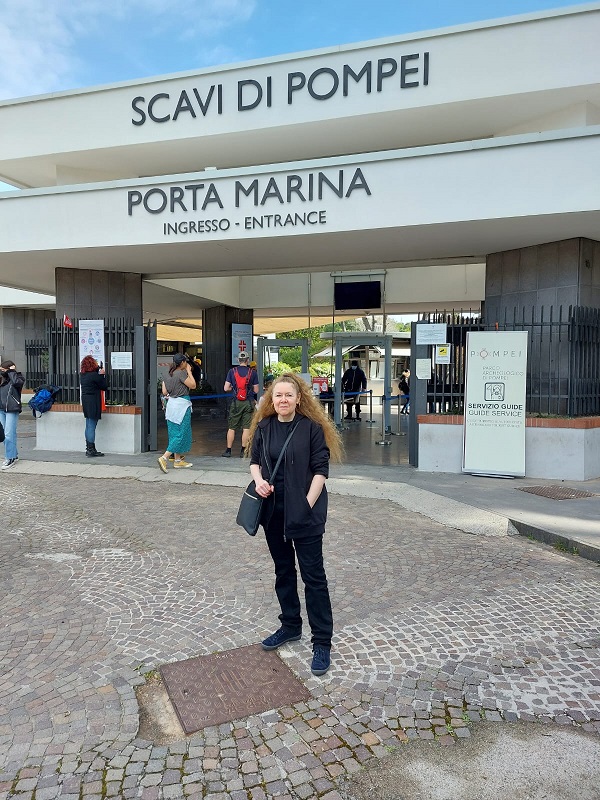 Christina at the entrance to the Pompeii site As I knew my novel would be focused on Pompeii in AD 79, I was able to narrow my research down a little, since the Roman Empire lasted a long time and not everything stayed the same. My starting point was a research trip to the site itself and the surrounding area of the Bay of Naples.
Visiting the ruins of the buried city and its neighbour Herculaneum was a wonderful experience, and vital for the invaluable details I wouldn’t have known about otherwise: how it felt to walk along the streets, what it was like to sit in a peristyle garden, how cramped the slaves’ quarters were and how dark the gladiators’ accommodation was, for example.
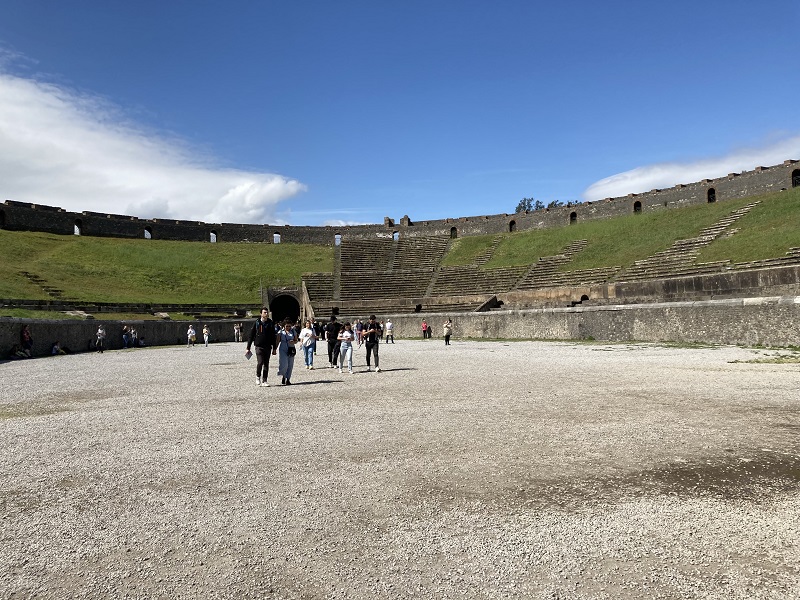
As the hero of my story is a gladiator, being able to stand in the magnificent amphitheatre was amazing. I could close my eyes and imagine the roar of the crowd, and how intimidating it must have been to walk into that arena knowing you might not leave it alive. I hope I have conveyed this accurately in Shadows in the Ashes! As historical authors, we can only use our imagination and the facts at hand and hope we get it right.
Thank you, Christina. The Bay of Naples is a fascinating place full of messages to us from the past.
———
Connect with Christina
Website: http://www.christinacourtenay.com
Facebook: https://www.facebook.com/christinacourtenayauthor?fref=ts
Twitter/X: https://twitter.com/PiaCCourtenay
Instagram: https://www.instagram.com/ChristinaCourtenayAuthor/
Bluesky: https://christinacourtenay@bsky.social
———
Discover what Shadows of the Ashes is about...
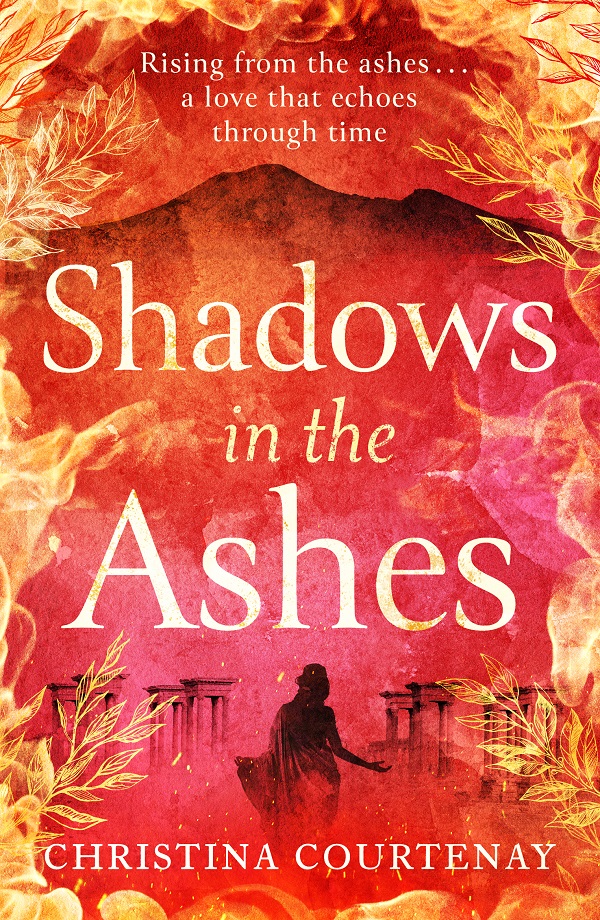 Rising from the ashes … a love that echoes through time Rising from the ashes … a love that echoes through time
Present Day – Finally escaping an abusive marriage, Caterina Rossi takes her three-year-old daughter and flees to Italy. There she’s drawn to research scientist Connor, who needs her translation help for his work on volcanology. Together they visit the ruins of Pompeii and, standing where Mount Vesuvius unleashed its fire on the city centuries before, Cat begins to see startling visions. Visions that appear to come from the antique bracelet handed down through her family’s generations…
AD 79 – Sold by his half-brother and enslaved as a gladiator in Roman Pompeii, Raedwald dreams only of surviving each fight, making the coin needed to return to his homeland and taking his revenge. That is, until he is hired to guard beautiful Aemilia. As their forbidden love grows, Raedwald’s dreams shift like the ever more violent tremors of the earth beneath his feet.
The present starts eerily to mirror the past as Cat must fight to protect her safety, and to forge a new path from the ashes of her old life…
Buy Shadows of the Ashes here: https://geni.us/STACC
Alison Morton is the author of Roma Nova thrillers – INCEPTIO, CARINA (novella), PERFIDITAS, SUCCESSIO, AURELIA, NEXUS (novella), INSURRECTIO and RETALIO, and ROMA NOVA EXTRA, a collection of short stories. Audiobooks are available for four of the series. Double Identity, a contemporary conspiracy, starts a new series of thrillers. JULIA PRIMA, Roma Nova story set in the late 4th century, starts the Foundation stories. The sequel, EXSILIUM, will be out in February 2024.
Find out more about Roma Nova, its origins, stories and heroines and taste world the latest contemporary thriller Double Identity… Download ‘Welcome to Alison Morton’s Thriller Worlds’, a FREE eBook, as a thank you gift when you sign up to Alison’s monthly email update. You’ll also be among the first to know about news and book progress before everybody else, and take part in giveaways.
If you enjoyed this post, do share it with your friends!Like this:Like Loading...
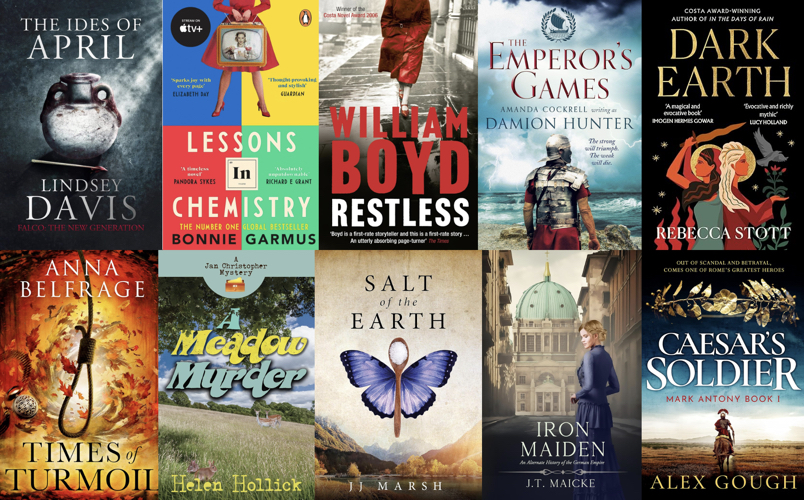
As in 2022, reading books has given me enormous pleasure. This year, I published a special 10th Anniversary hardback edition of INCEPTIO with a gorgeous case cover and dust jacket by Jessica Bell Design, plus contributed a story called ‘My Sister’ to a collection Historical Stories of Exile.
Enough of me, the writer; in this post I’m writing as a reader.
This is not a beauty contest nor a selection. I chose the books that make up the image randomly. The list below contains just books I’ve read this year and enjoyed. Some made me catch my breath, others made me weep with joy or sorrow and others appalled me. But I loved the experience of reading them all.
I’m not mentioning those I didn’t enjoy or part-read – that’s not fair to the authors concerned as I’m probably not their ideal reader.
I’m a fussy reader. I use Amazon’s ‘Send a free sample’ service mercilessly, especially if it’s an author new to me. But I have discovered some real gems that way.
Oh, and I’ve read a few non-fiction for research and ‘professional development’.
Fiction
Restless, William Boyd (re-read)
Legion XXII: The Capsarius, Simon Turney
Cloud Cuckoo Land, Anthony Doerr
The Lost Apothecary, Sarah Penner
Alternate Endings: A Short Story Anthology of Historical What Ifs, by Samantha Wilcoxson, Sharon Bennett Connolly, Michael Ross, Cathie Dunn, Karen Heenan, Salina B Baker, Virginia Crow, Elizabeth K Corbett & Stephanie Churchill
Winter Wedding at Bletchley Park, Molly Green
Mistake of Murder, Helen Hollick
Dark Earth, Rebecca Stott
The Glass Painter, Clare Flynn
The Ides of April, Lindsey Davis
City of Vengeance, D V Bishop
The Contraband Killings, Lucienne Boyce
A Tidy Ending, Joanna Cannon
The Venice Secret, Anita Chapman
Lost in Time, A G Riddle
Caesar’s Soldier, Alex Gough
The Weather Woman, Sally Gardner
The Maids of Biddenden, G D Harper
The Secrets We Keep, A J Wills
Sisters of Castle Leod, Elizabeth Hutchison Bernard
Promises of the Runes, Christina Courtenay
Siren Song, J J Marsh
Saturnalia, Lindsey Davis (re-read)
A Quiet Death in Italy, Tom Benjamin
Rocco and the Snow Angel, Adrian Magson
Death on the Marais, Adrian Magson
Murder Imperial, Paul Doherty
The Wild Poppy, Julia Bell
The Secrets of Hawthorn Place
The Wall, Douglas Jackson
Times of Turmoil, Anna Belfrage
Falling Sky, Harry Sidebottom
A Meadow Murder, Helen Hollick
Artful Antics at St Brides, Debbie Young
Signal Moon, Kate Quinn
Deadly Election, Lindsey Davis
The Garden of the Hesperides, Lindsey Davis
Rogue, Charlene Newcomb
The Husband Criteria, Catherine Kullman
The King’s Jewel, Elizabeth Chadwick
Lessons in Chemistry, Bonnie Garmus
Third Nero, Lindsey Davis (re-read)
The Beacon at Alexandria
The Maid of Linden Hall, Katie Hutton
Salt of the Earth, J J Marsh
Moonshadows, Melinda Hammond
Secret Meetings, J G Harlond
Iron Maiden, J T Maicke
The Gladiator Only dies Once, Steven Saylor (re-read)
The Secrets of Morgarten, L S Mangos
Fatal Legacy, Lindsey Davis
A Vain and Indecent Woman, Colin Falconer
The Emperor’s Games, Damion Hunter
Catalina’s Riddle, Steven Saylor
Christmas with Sophie Sayers, Debbie Young
Blackshirt Masquerade, Jason Monaghan
The Picture House Murders, Fiona Veitch Smith
Non Fiction
How To Survive in Ancient Rome, L J Trafford
Blurb Your Enthusiasm, Louise Willder
The Fall of the Roman Empire, Peter Heather
How to Best Optimize Blog Posts for SEO, Rachel Thompson
The Darkening Age: the Christian Destruction of the Classical World, Catherine Nixey
Vindobona, Michaela Kronberger
The Idea of the City in Roman Thought, Lidia Storini Mazzolani, trans. S. O’Donnell
How to Be Right, James O’Brien
On to 2024…
Alison Morton is the author of Roma Nova thrillers – INCEPTIO, CARINA (novella), PERFIDITAS, SUCCESSIO, AURELIA, NEXUS (novella), INSURRECTIO and RETALIO, and ROMA NOVA EXTRA, a collection of short stories. Audiobooks are available for four of the series. Double Identity, a contemporary conspiracy, starts a new series of thrillers. JULIA PRIMA, Roma Nova story set in the late 4th century, starts the Foundation stories. The sequel, EXSILIUM, will be out in February 2024.
Find out more about Roma Nova, its origins, stories and heroines and taste world the latest contemporary thriller Double Identity… Download ‘Welcome to Alison Morton’s Thriller Worlds’, a FREE eBook, as a thank you gift when you sign up to Alison’s monthly email update. You’ll also be among the first to know about news and book progress before everybody else, and take part in giveaways.
If you enjoyed this post, do share it with your friends!Like this:Like Loading...
|
Subscribe to Blog via Email
Join 368 other subscribers.
Categories
Archive
|
 Today I’m delighted to welcome writing friend Jane Davis back to the writing blog. I’ve loved her books; they regularly appear in my best books of the year round up. Her first novel, ‘Half-Truths and White Lies’’, won a national award established with the aim of finding the next Joanne Harris.
Today I’m delighted to welcome writing friend Jane Davis back to the writing blog. I’ve loved her books; they regularly appear in my best books of the year round up. Her first novel, ‘Half-Truths and White Lies’’, won a national award established with the aim of finding the next Joanne Harris.  London, 1775: The only surviving child of six, Dorcas Turton should have been heiress to a powerful family name. But after her mother’s untimely death, she is stunned by the discovery that her father’s compulsive gambling has brought them close to ruin. With the threat of debtor’s prison looming large, she must employ all her ingenuity to keep their creditors at bay.
London, 1775: The only surviving child of six, Dorcas Turton should have been heiress to a powerful family name. But after her mother’s untimely death, she is stunned by the discovery that her father’s compulsive gambling has brought them close to ruin. With the threat of debtor’s prison looming large, she must employ all her ingenuity to keep their creditors at bay.























